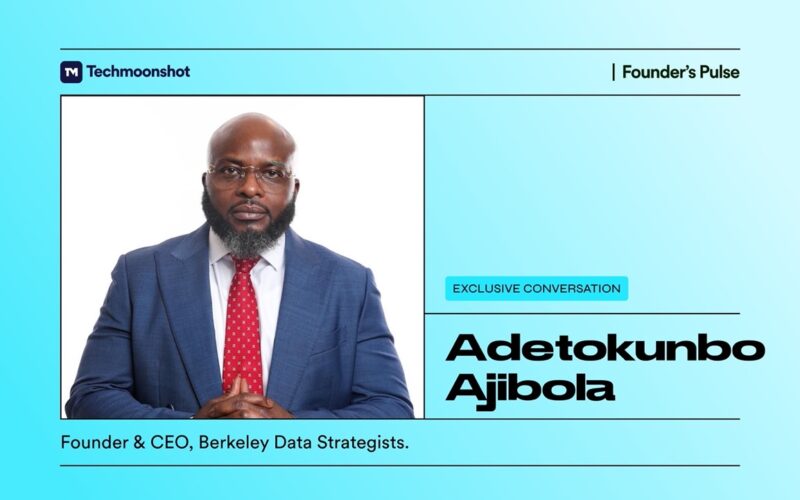Adetokunbo Ajibola is the founder and CEO of Berkeley Data Strategists, a firm he established after over two decades of experience in data management and data governance. Driven by a commitment to empower people of color to enter data-focused careers, Adetokunbo shares his expertise through consulting and recently expanded the company’s offerings to include recruitment services. He is a native of Ogun State, Nigeria, a dedicated family man, and an avid reader with a passion for sports and fitness. His love for books reflects his belief that knowledge is a powerful tool for personal growth and success.
In this exclusive conversation, Adetokunbo Ajibola, founder and CEO of Berkeley Data Strategists, shares his journey from a 24-year career in data management and governance to launching his own firm. Driven to empower people of color to pursue data governance and management careers, Adetokunbo uses his extensive experience to consult with organizations and recently expanded his services to include recruitment.
Through Berkeley Data Strategists, he continues to champion knowledge as a tool for success and self-improvement.
Can we get to know you?
I’m Adetokunbo Ajibola, the founder and CEO of Berkeley Data Strategists, a company I established after dedicating 24 years to the data management and governance field. I started this venture to share my knowledge and experience, particularly to support people of color in entering and thriving in careers in data governance and management. In addition to consulting for various organizations, we recently expanded our services to include recruitment.
On a personal note, I’m a family man with a wife and two children, proud to be from Ogun State, Nigeria. I’m also a Christian, sports enthusiast, and avid reader—I read all sorts of books because I believe that if you want to keep something from those who don’t value learning, you can hide it in a book.
Coffee or tea? Which one gets you, up and running in the morning?
Definitely coffee. Yes.
Can you tell us a bit about your journey and what inspired you to start Berkeley data strategists?
My journey began over two decades ago. I earned a first degree in Chemical Engineering from the University of Sheffield, where I also completed an MSc before starting my career as an engineer. However, as I planned to settle down, I realized I didn’t want to work in the remote locations where chemical engineering often took me, like British Nuclear Fuels in Cumbria. I decided to pursue an MBA at the University of Manchester, which led me to a role in the investment banking sector.
I transitioned into project and program management, focusing on regulatory projects for investment banks. Then, when Lehman Brothers collapsed, new regulatory demands emerged, including the BCBS 239 regulation. This marked the beginning of data management and data governance, and I was there from the start, helping banks like JP Morgan, Credit Suisse, Royal Bank of Scotland, and HSBC implement these critical frameworks.
After some time, I started working independently, which eventually led to the founding of Berkeley Data Strategists. Five years ago, at a data conference, I noticed I was the only Black person in the room—a recurring experience. This realization inspired me to start a training initiative, aiming to bring more people of color into data management and data governance.
So what was your initial problem or gap in the market that you aim to address with Berkeley data strategists?
Many organizations have substantial data at their disposal but often overlook its full potential. The gap I identified with Berkeley Data Strategists is in helping these organizations uncover and understand the data they possess. We guide them in refining this data so that it aligns with their business strategies, enabling them to rely on accurate, high-quality data for regulatory compliance and informed decision-making.
Currently, much of our work focuses on AI and cloud technology. While there’s widespread interest in AI, effective AI applications require trusted, refined data—another area where we support organizations. Additionally, we’re helping to bridge the skills gap by training people in data management and governance. There’s a significant demand for talent in AI and data, yet these specialized skills are scarce, and we’re working to fill that gap by empowering organizations and upskilling talent in this crucial area.
In your experience, how has the role of data and business strategy evolved over the past decade?
The field of data governance has changed considerably. Initially, it was largely confined to investment banking, as regulators required globally systemic important banks to implement data governance and management frameworks to ensure they could promptly report risk and finance data. This led locally systemic important banks to adopt similar frameworks as a best practice.
In the last decade, however, data governance has expanded across industries as companies recognize the need for reliable, well-managed data. This shift has allowed me to work across various sectors beyond finance. I’ve collaborated with government agencies, such as serving as Chief Data Officer at the Saudi Data and Artificial Intelligence Authority, and I’ve worked within asset management, insurance, utilities, and telecommunications. Recently, I led a comprehensive data governance initiative for British Telecom, spanning its operations in 219 countries. In the pharmaceutical sector, I’ve worked with leading companies like AstraZeneca and GSK, where data management plays a critical role in research, regulatory compliance, and operational efficiency.
Today, organizations across industries are implementing data governance frameworks to ensure data reliability and compliance, recognizing the value of these structures in an increasingly data-driven world.
In your opinion, what are some of the biggest data-related challenges that organizations face today?
Firstly, a significant challenge is data literacy. Many organizations lack a clear understanding of the importance of data and the value it can bring. This gap in literacy limits the ability to leverage data fully for strategic decision-making. Additionally, as AI applications increase, data ethics has become a pressing concern. The presence of high-quality data doesn’t always imply it should be used indiscriminately; ethical considerations around privacy, consent, and fairness are critical.
Another hurdle is the shortage of skilled professionals capable of managing and interpreting data effectively. Many organizations are finding it difficult to build teams with the necessary expertise in data management, AI, and analytics. Lastly, the ever-evolving regulatory landscape adds another layer of complexity. Staying updated with new data regulations and compliance requirements is an ongoing challenge that many organizations struggle to meet effectively.
These issues—data literacy, ethical considerations, skill shortages, and regulatory changes—are among the most pressing data challenges facing organizations today.
In an alternate universe where you are not in data strategy. What field do you think you’ll be working in?
If things had turned out differently, I would probably have been a medical doctor, as it was always my dream career. My parents even purchased land and started building a hospital while I was in my final year of secondary school. After completing my SSCE, I took the JAMB exam and scored high enough to qualify for medical school at the University of Ibadan. However, when the admission list was released, my name was missing.
Instead, I was offered microbiology with the option to transfer to medicine after my first year if I performed well. I did well but was still denied the switch, so I began my second year in microbiology. At that point, I told my parents I wanted to study abroad instead of continuing with microbiology.
When I arrived in the UK, I encountered a rigid educational system that required A-levels for university admission, particularly for top-tier universities. So, I spent my first year in the UK completing my A-levels.
At that point, my friends back home were already in their third year, and I had some hard thinking to do. Medicine would take another seven years, and I didn’t want to be that far behind, so I settled on chemical engineering, which was a three-year course and still intellectually challenging. Looking back, it was the right choice—I truly enjoyed chemical engineering and everything it set me up for.
What trends do you see shaping the future of data science and analytics?
The main trends I’m seeing are definitely AI and cloud technology. Cloud adoption is progressing rapidly, likely reaching a broader scale sooner, while AI implementation may take a bit longer to fully develop and integrate. But without a doubt, both AI and cloud technology are shaping the future of data management.
With the rapid advancement in AI, do you foresee any major shift in how businesses will leverage data in the coming years?
Almost every organization is now incorporating AI in some form. In fact, statistics show that 67% of global organizations have implemented at least one AI initiative. For example, many are using AI in recruitment processes or for optimizing order shipments. I recently attended the AI Summit in London, where discussions centered on the potential for AI to replace jobs in various sectors, including education, manufacturing, and beyond. This shift is a clear indication of how AI is transforming industries at a rapid pace.
How do Berkeley data strategists plan to evolve, to stay ahead in this fast-changing field?
To stay ahead of the curve, we focus on engaging with key stakeholders through conferences, seminars, and summits. This enables us to continuously interact with governments and executives across various sectors to understand their drivers, goals, and initiatives, ensuring that our data solutions align with their needs.
Additionally, through my mentorship program, I maintain strong connections with professionals from diverse industries. This gives me valuable insights into sectors like finance, insurance, pharmaceuticals, and telecoms, allowing me to grasp the emerging trends and use cases within those fields.
By staying connected with industry developments, we can adapt our training curriculum to meet the evolving demands of the market. As new skills become necessary for specific roles, we ensure that our programs are updated to provide the relevant expertise, ensuring that our students are equipped for the future of data management and governance.
What’s a fun fact about you that would surprise people who know you professionally?
Professionally, people know me as “Mr. Ade” — someone who’s not camera shy and enjoys talking extensively about data. This side of me might surprise those closest to me, like my family and close friends, who see me as a more quiet, reserved individual. I tend to keep to myself and don’t have many friends. However, on social media, people often recognize me as the outgoing “Mr. Ade” that they see online.
As a leader, what are some of the most valuable lessons you have learned in guiding a data-focused company?
When guiding a data-focused company and taking on a leadership role, the biggest challenge is often the culture. Data management and governance are inherently about change, so it’s important to integrate them smoothly into the existing organizational culture. The goal should be to make these practices enablers rather than disruptors of the established workflows.
The primary challenge is shifting the way people think about their work. They need to see data as an asset and treat it with the same care and structure as other business resources. This includes following policies, adhering to procedures, and meeting compliance standards. Overcoming the resistance to change and embedding these new practices in the daily operations of the organization is crucial.
What advice would you give to aspiring data scientists and entrepreneurs who want to make an impact in the data field?
First, don’t rush. The data field is vast, and entering it as an entrepreneur requires a thoughtful investment of both time and money. Make sure you possess the right skills or surround yourself with the right people who have them. If you’re pursuing a career in data, understand that it’s not a sprint—it’s a marathon. There are many paths to success, especially in data management and governance, so continue developing your skills over time.
Stay committed to evolving with the industry. Engage with those who have experience, learn from them, and keep advancing. A lot of this growth comes from self-learning, driven by passion. If you’re not passionate, it will be hard to keep going.
Invest in yourself—seek mentors, read extensively, and attend conferences that truly add value. Avoid free seminars that don’t contribute much to your growth. Set aside a budget to advance your career and develop your skills. This investment in yourself will pay off in the long run.
What is your favorite tech gadget you can’t do without?
The tech gadget I can’t do without is definitely my iPhone. It’s essential for staying connected and managing my work. Alongside it, my tripod is also key for recording videos or speaking with people on Instagram, ensuring I can create and engage with my audience smoothly. So, without a doubt, my iPhone is my most indispensable tech gadget.
What’s a common myth about data science that you wish would disappear?
A common myth about data science is that it’s all about numbers and complex calculations. While data science does involve analytics and interpreting large datasets, it’s not just about crunching numbers. It’s about deriving valuable insights that can help organizations align with their business goals and improve their operations. In essence, data science is a tool for making smarter decisions, optimizing processes, and driving growth, rather than simply a technical task of number crunching.
What excites you the most about the future of Berkeley data strategists?
A lot excites me at the moment, especially as the future looks incredibly bright. We are well-positioned to seize opportunities in AI, cloud technology, and evolving use cases. The regulatory landscape is also shifting in our favor. Our growing recognition across Africa, particularly in Nigeria and Kenya, is another exciting development. More organizations are reaching out to us, eager to learn about our work and explore potential collaborations. It’s clear that Africa holds immense potential, and being African myself, it’s both an honor and a privilege to contribute to this transformation.
If you could use data to solve any global issue instantly, what would it be?
I think the biggest challenge these days is traffic. Many cities are grappling with congestion, and the issue seems to be growing with the increasing population. I recently experienced this in New York when traveling to the airport—it was taking longer than usual to get there. It made me realize that while the world’s population is expanding rapidly, transport management systems in many countries, especially in cities like Lagos, are not fully utilizing data to optimize traffic flow, plan road networks, and tackle congestion. It would be interesting to see how data could be leveraged to solve this issue and improve transportation management.
Finally, can you share a book, podcast, or any resources that have significantly impacted your career growth?
When I was around 26 or 27, I read The 7 Habits of Highly Effective People by Stephen Covey, which has stayed with me throughout my career. The key themes of the book, like consistency, determination, and having a passion for what you do, have really shaped how I approach my work. It’s about putting in the effort every day, even when you’re not feeling it, and focusing on doing the work before expecting rewards. This mentality has helped me stay grounded in my professional journey. I think the focus on personal growth and discipline in that book is something everyone can benefit from.
It’s been nice talking to you, Mr. Ade
It’s been a pleasure talking to you as well! Thank you.












